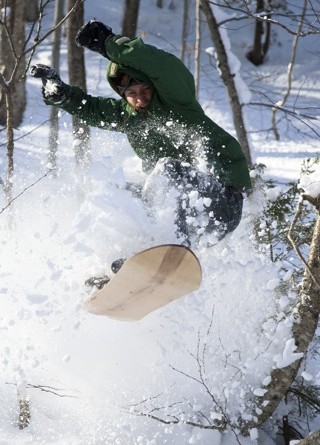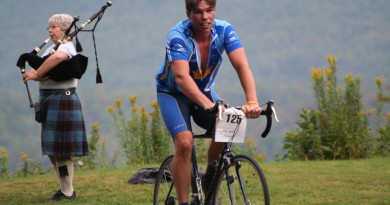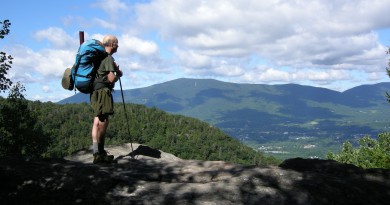Board and Bred | Empyreal and PowderJets Bring Snowboard Manufacturing Back Home
If it were a different sort of winter—say, with piles of fluffy white stuff on the shores of Lake Champlain—entrepreneur Spencer Ford and I could talk about Vermont snowboards as we rode in powder down the hill by Burton headquarters.
Instead, the only fluffy white stuff we’re diving into is the foam on a klinger’s coffee drink that he’s sipping during our interviewed in Burlington.
But really, we don’t need to talk about that behemoth company down the road, nor the thousands of boards it’s outsourced to employees in Austria. Not when we can talk about a much, much, smaller company just up the road, and the handfuls of boards it makes right here, by hand, in Vermont: Ford’s own Empyreal Snowboards.
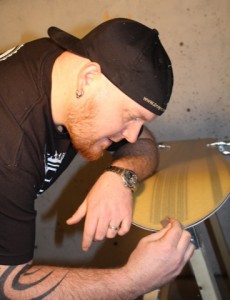
Like the Rupert-based PowderJet (and not at all like the big guys at Burton or Waterbury’s Rome) Empyreal is redefining what it means to be a snowboard manufacturer in Vermont. Confidence is part of it. “The boards we’re selling now are better than anything else you can buy,” says Ford. “People who are trying them on the mountain are shocked at how good they are, especially the handmade aspect. No one really does that anymore.”
Until now.
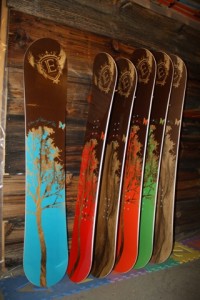
Founded in 2010, Empyreal grew out of a life not only in the mountains but also in the swamplands of Sarasota, Fla. Born and raised mostly in tiny Mosquitoville, Vt., Ford was a skier and a student who graduated from Phillips Exeter Academy in New Hampshire and sharpened skis for Peter Glenn before attending Hobart and William Smith Colleges. His first-year roommate converted Ford to snowboarding.
He was hooked on the sport, but wanted to ride something that could better handle the variable conditions of the Green Mountains.
What would it take to make his own board? “It was incredibly expensive,” Ford says. “Hundreds of thousands of dollars.”
With that idea on hold, Ford fled New England for Florida and became part owner in his uncle’s custom-car company in Florida, Sh-Boom Street Rods, where he spent several years learning the basics of metalworking, welding, painting, and building with fiberglass.
Eventually, Ford returned to the Green Mountains with his wife (whom he met in Sarasota), and after finishing his degree at the University of Vermont, he began fishing around for a new start-up when his former college roommate suggested looking into snowboards once again. Why not build a product that could handle the East Coast’s fickle conditions, from early morning powder to late-afternoon crusty bumps?
“I thought, ‘This is exactly what I have to do,’” recalls Ford, who now had the labor skills and the network to build boards for relatively reasonable amounts of money.
The result is Empyreal, whose setback stance and camber Ford and his creative director, Weston Smith, designed to offer the same comfort and ease-of-turning as shaped skis. “When the shaped ski came out, all the snowboarders got back into skiing,” says Ford. “I also found that most snowboards aren’t really marketed toward adults.”
After a trial-and-error period with super-stiff boards, Ford and Smith settled on their unique concoction of poplar, fiberglass, carbon fiber, epoxy, Kevlar, and steel, just about all of it (98 percent) made in the United States. “We buy the most expensive stuff we can,” says Ford, explaining that the racing-yacht materials also set Empyreal (which means sublime, and whose boards start at $499) apart. “It would be much cheaper for us just to design and have a large factory make the boards, and it would be so much easier, but producing them to our own standards of quality is important.”
One thing they didn’t have to splurge on was rent: Ford and Smith work on family land in Barnet, in a 2,000-square-foot workshop at Ford’s home and a barn moved to the property from his mom’s house. While Barnet isn’t the first town that comes to mind when one thinks manufacturing, it suits Empyreal’s needs just fine.
“I like it out West, but I wouldn’t want to live there,” says Ford. “I’m a Vermont guy.”
Ford and Smith spend about 14 hours of labor on each of the 150 Empyreal boards they make each year, and they spread the word through on-mountain demos at Burke and other mountains and through discount rewards for buyers.
“Both of our parents say, ‘It’s all about getting bigger and making more, right?’” says Ford. “And we’re like, ‘Not really.’”
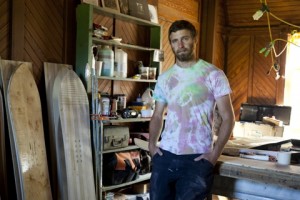
Sharing a similar philosophy is Jesse Loomis, who handcrafts about 100 PowderJet wooden backcountry snowboards each year and sells them for $450 and up. Though they are specifically designed for powder, something (ahem) not seen around Vermont much this season, Loomis has gained a following in British Columbia, Oregon, and Japan. He’s also lectured to students in Dartmouth College’s engineering school about snowboard evolution.
“Back in the ’80s, Burton started in southern Vermont, right next to us,” says Loomis. “I remember being a knucklehead 10-year-old thinking, ‘They’re just making fashion up off the top of their head,’ and now they’re professionals.”
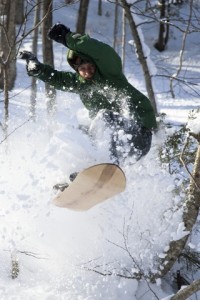
To bring back simplicity to the sport of snowboarding, Loomis deliberately leaves his PowderJets graphic-free, while you’ll find everything from hot-air balloons and snowflakes to poplar trees and whacked-out custom graphics on an Empyreal board.
What you won’t find at either company is a cafeteria, an employee garden, or a skate park. Just a few people passionate about snowboarding, bent over a board until it’s done.
Until it’s perfect: Ford and Smith hand-finish each board with a razor blade and sandpaper. “If I were doing this to compete with a Rome or a Burton—I wouldn’t even try,” says Ford. “I would be shocked if they had even heard of us.”

